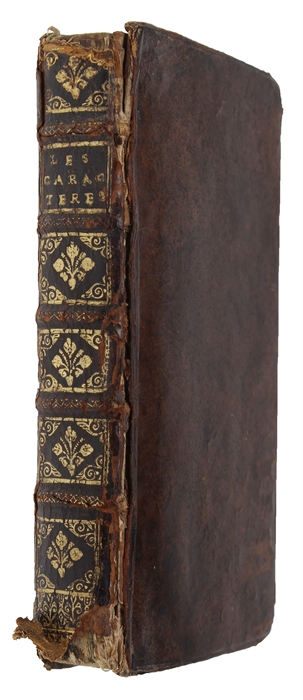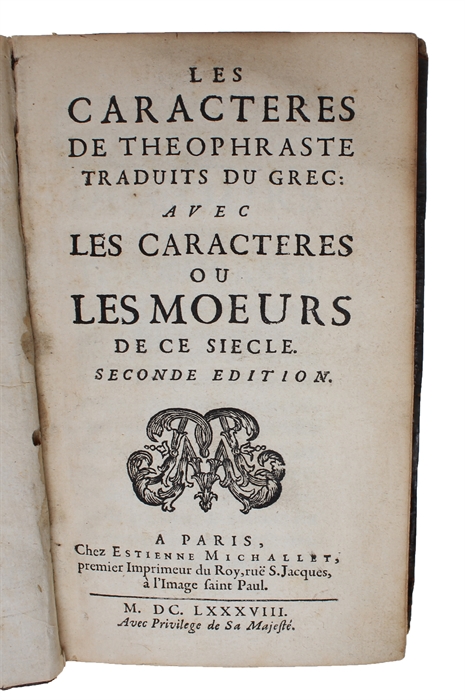THEOPHRAST - LA BRUYÈRE - THEOPHRASTUS - THEOPHRASTE.
Les Caracteres de Theophraste traduits du grec : Avec les Caracteres ou les Moeurs de ce Siecle. Seconde edition.
Paris, Estienne Michallet, 1688.
Cont. full calf. 5 raised bands on back, back richly gilt, all edges of boards gilt. Lacking leather at capitals, front-hinge cracked, so cords are showing.
Second or third printing of the original edition. The title-page states "seconde edition", but it is probably the third, printed in the same year as the first and second, being a page-by-page re-impression of the second, except for the fact that corrections have been made and the errata-leaf is thus not printed in the third. Both the second and third original editions are from the same year and by the same printer as the first. "La seconde édition, également impr. en 1688 n'offre que quelques légers changements..., et la troisième, sous la même date, ne qu'une simple réimpression de la seconde." (Brunet III:720).
This work includes the first French translation of Theophrast's Characters (and probably the first translation into any modern language?). "Theophraste a eu le grand honneur, comme on sait, d'être ttraduit au XVIIe siècle par La Bruyère: et c'est pourquoi, en France plus que dans tout autre pays, en dehors même du cercle des érudits, son nom et son opuscule sont populaires." (navarre, Budé-edition of "Caractères", Paris, 1920).
Jean de la Bruyère (1639/1644 - 1996) was a very famous French moralist and writer. "C'est au commencement de 1688 que parut la premiere édition des "Caractères de Théophraste traduits du grec, ou les Mæurs de ce siècle." L'auteur mettait ses propres observations sur la société moderne sous le patronage d'un ancien." (N.B.G. p. 427). The "Characters" gave La Bruyère quite a few enemies and created furor in the learned world. In Denmark Holberg calls him "trivial and simple" (Epistle 404). "Mais si en effet la malignité contemporaine, applaudissant aux traits satiriques de l'ouvrage, a peu contribuer à sa vogue, le jugement de la postérité l'a consacré comme un des meilleurs livres de notre langue." (N.B.G. p. 427). This work is thus still considered to be one of the greatest French books. Voltaire writes in "Siecle de Louis XIV, c. XXXII": "On peut compter parmi les productions d'un genre unique les "Caractères" de La Bruyère. Un style rigide, concis, nerveaux, des expressions pittoresques, un usage tout nouveau de la langue, mais qui n'en bless pas les règles, frappèrent le public".
Bruyère's work with the translation really did cause astonishment and had an immense impact on late 17th century Europe and onwards; it created a new literary genre in Europe, and the age of Enlightenment was delighted with the short, precise characterizations of people and their customs. For an analysis of the contents and the impact on the time of La Bruyère see Nouvelle Biographie Generelle (N.B.G. pp. 426-39). Brunet V:798 + III:721, Graesse 4:61.
Order-nr.: 27999


